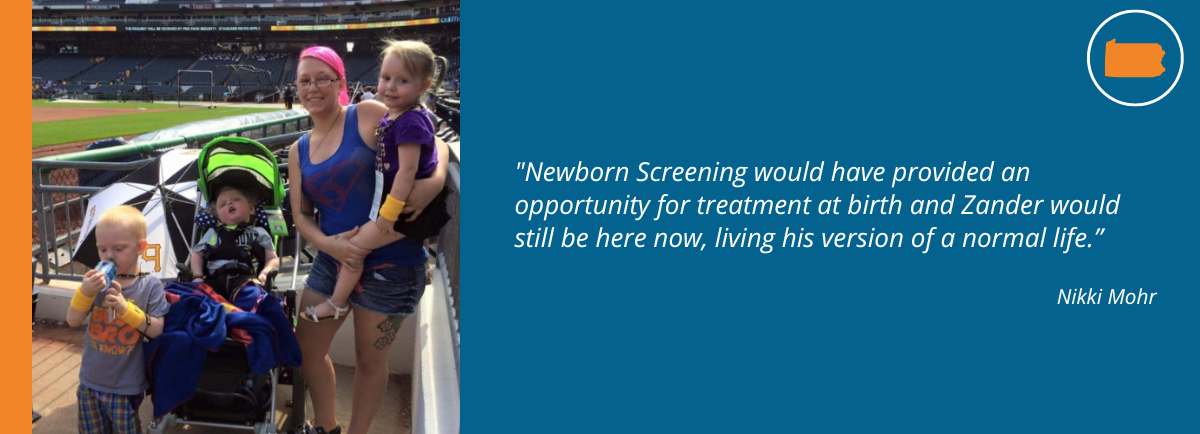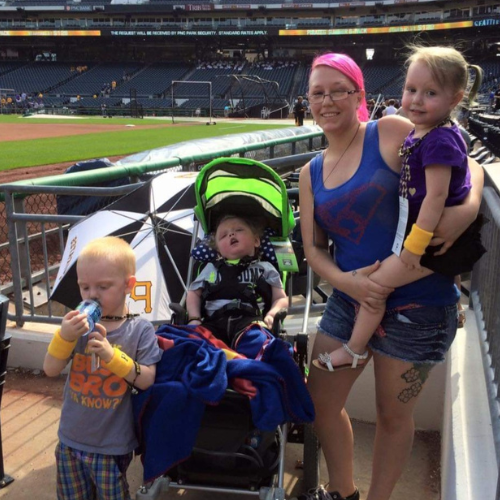DOWNLOAD STATE FACT SHEET AS PDF

In 2020, there were 130,693 live births in Pennsylvania2 There are 61 conditions on the Pennsylvania Newborn Screening Panel3
All babies in the United States are screened for several conditions shortly after birth. Approximately 24-48 hours after a baby is born in the United States, a nurse pricks the heel to collect a small blood sample. Afterward, the nurse puts a series of blood drops onto a filter paper to create several “dried blood spots.” Next, the newborn screening card is sent to the state laboratory for analysis. Pennsylvania is 1 of 11 states currently testing for Krabbe disease. They started screening all newborns for Krabbe disease in 2020.
What is Krabbe Disease?
Krabbe disease (pronounced krab A), is a rare genetic disorder, also known as globoid cell leukodystrophy. In the United States, Krabbe disease has been reported to affect approximately 1 in 100,000 individuals. Infantile Krabbe disease is the most common and severe form causing infants to lose the ability to eat, extreme irritability, inability to sit up, grasp objects, blindness, and seizures. Sadly, infants die within the first 2-3 years of life in states that do not test for Krabbe disease. We invite you to learn more about Understanding Krabbe Disease.
Why Screen for Krabbe Disease?
Krabbe disease is a severe neurodegenerative and rapidly progressing condition requiring immediate treatment for the most severe forms. The medical issues and symptoms of Krabbe disease are very significant and life-impacting. A delayed diagnosis, especially in the most severe forms, equates to palliative and supportive care as the only means of treatment until premature death.
Krabbe Disease Hero: Zander Mohr

See all our Krabbe Disease Heroes.
Nikki Mohr celebrated the birth of her son, Zander, in 2014. She had no reason to believe that anything was wrong with her healthy, happy baby, so when he began to show troubling symptoms she was immediately concerned. He began having what they thought were febrile seizures, which led to an admission to the hospital; during that stay, he also lost his ability to drink from a bottle. It took more than a month for Nikki to obtain an accurate diagnosis for Zander. After a long hospital stay and many tests, Nikki was told by their family doctor that eleven-month-old Zander had Krabbe disease. Another doctor they had seen prior to the official diagnosis had mentioned the possibility of Krabbe disease, so Nikki was already aware of the condition and had done some research. She was put in touch with Dr. Maria Escolar immediately and that visit confirmed Nikki’s worst fear – he wasn’t eligible for a transplant and wouldn’t live a long life.
Nikki was devastated by this diagnosis but chose to give Zander the best possible life and cherished every moment. He loved his puppy, Nala, and loved when his siblings would talk to him and play with him. Zander passed away in 2016 at the age of two.
As of 2021, Pennsylvania now screens for Krabbe disease, but it was too late to impact Zander’s journey. When asked what impact Newborn Screening would have had on her family, Nikki said: “Newborn Screening would have provided an opportunity for treatment at birth and Zander would still be here now, living his version of a normal life.”
Resources
- The Leukodystrophy Newborn Screening Action Network is dedicated to advancing newborn screening for leukodystrophies and lysosomal storage disorders, supporting newly-diagnosed families, and ensuring collaboration between all stakeholders. Learn more at https://ldnbs.org/.
- CDC offers funding and assistance through the Newborn Screening Quality Assurance Program (NSQAP). More information can be found at https://www.cdc.gov/labstandards/nsqap.html.
- Baby’s First Test provides funding opportunities through grants. Learn more at https://www.babysfirsttest.org/newborn-screening/funding-opportunities.
- American Public Health Laboratories NewSTEPS program provides data, technical assistance, and training. Details at https://www.newsteps.org/.
- KrabbeConnect offers patient support services to help families navigate the burden of Krabbe disease. Learn more at https://krabbeconnect.org/.
- Hunter’s Hope Foundation is a non-profit organization committed to giving hope through education, awareness, research, and family care for all leukodystrophies. Learn more at https://www.huntershope.org.
Citations
- Wenger DA. Krabbe Disease. 2000 Jun 19 [Updated 2011 Mar 31]. In: Pagon RA, Adam MP, Ardinger HH, et al., editors. GeneReviews® [Internet]. Seattle (WA): University of Washington, Seattle; 1993-2017.
- “Fertility Rate: Pennsylvania, 2010-2020.” March of Dimes | PeriStats, https://www.marchofdimes.org/peristats/data?reg=99&top=2&stop=1&lev=1&slev=4&obj=1&sreg=42&creg. Accessed 31 July 2023.
- “Pennsylvania| Baby’s First Test | Newborn Screening | Baby Health.” Babysfirsttest.org, 2015, https://www.babysfirsttest.org/newborn-screening/states/new-jersey. Accessed 7 July 2023.
All information in this fact sheet is based on data available before July 31, 2023.


